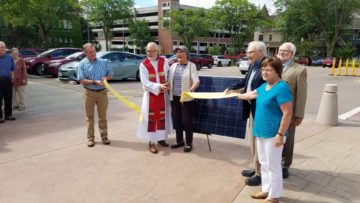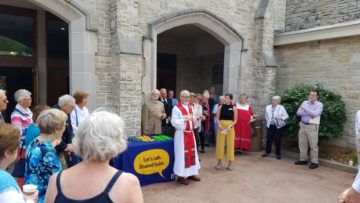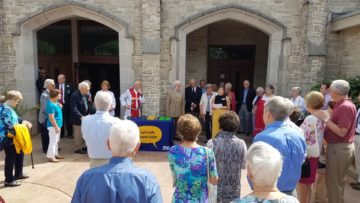Caring for Creation Schedule
Church in the Wild, Dinner, and a Movie – Saturday, April 22, 2023
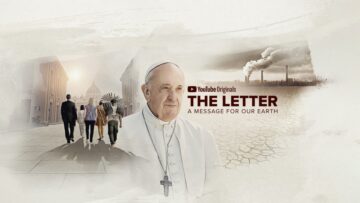 Join Caring for Creation and ACTJAM (A Call to Justice and Mercy) in one, two or all three special Earth Day activities to celebrate the gift of God’s creation and to strengthen our commitment to care for our common home and its inhabitants.
Join Caring for Creation and ACTJAM (A Call to Justice and Mercy) in one, two or all three special Earth Day activities to celebrate the gift of God’s creation and to strengthen our commitment to care for our common home and its inhabitants.
Go to Event
May 10, 2022 at 7:30pm – Online Event
Solving the Climate Challenge — Perspectives from a Science Mom
Dr Tracey Holloway
Risks to humanity, complex science, and charged politics: Climate change is a daunting topic to talk about. But solutions depend on our ability to share perspectives, think through options, and move forward together. The nonpartisan Science Moms initiative started in 2021 to demystify climate science, and empower public engagement by moms and all of us.
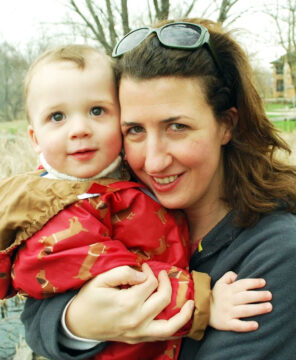 Tracey Holloway will provide an overview of the Science Moms initiative, lessons learned from over 50 years of the Clean Air Act, and strategies to address climate change. She’ll share her own perspectives on environment, science, and thinking about the future as a mom of two boys, ages 12 and 2.
Tracey Holloway will provide an overview of the Science Moms initiative, lessons learned from over 50 years of the Clean Air Act, and strategies to address climate change. She’ll share her own perspectives on environment, science, and thinking about the future as a mom of two boys, ages 12 and 2.
Tracey is one of the founding Science Moms, and a Professor at the University of Wisconsin-Madison in the Nelson Institute for Environmental Studies and the Department of Atmospheric and Oceanic Sciences. Following her Sc.B. in Applied Mathematics at Brown University and Ph.D. in Atmospheric and Oceanic Sciences at Princeton University, Tracey joined UW-Madison in 2003 as part of a cluster hire on energy systems, science and policy. Today, her research group engages an interdisciplinary team of scientists, graduate students, and undergrads to examine connections between air quality, climate, energy, and health. She leads the national team for NASA linking satellite data with health and air quality. She works with partners from the Wisconsin Department of Natural Resources to the US Environmental Protection Agency, from MG&E to the American Lung Association.
REGISTER HERE
April 12, 2022 at 7:30pm
Grassland 2.0 – Restoring Prairie and People to Agriculture!
Randy Jackson, Campbell-Bascom Professor of Grassland Ecology, UW-Madison
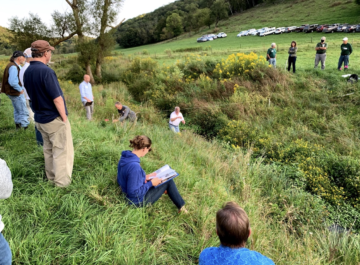 Grassland 2.0 is a movement to transform our agriculture from an extractive, wealth-generating system to a regenerative system that puts caring for people first. Our current agricultural system mainly rewards multinational corporations who maintain it with narratives about “self-sufficiency,” “feeding the world,” and “maintaining cheap food.” An agricultural system based on well-managed perennial grassland can be profitable to farmers and support vital, thriving rural communities, yet simultaneously help to stabilize the climate, clean our waters, reduce flooding, and support biodiversity. But for this new system to be truly regenerative, it must afford access to land by all people who want to farm and reward those who care for the land. When we care for the land, we are caring for ourselves and each other.
Grassland 2.0 is a movement to transform our agriculture from an extractive, wealth-generating system to a regenerative system that puts caring for people first. Our current agricultural system mainly rewards multinational corporations who maintain it with narratives about “self-sufficiency,” “feeding the world,” and “maintaining cheap food.” An agricultural system based on well-managed perennial grassland can be profitable to farmers and support vital, thriving rural communities, yet simultaneously help to stabilize the climate, clean our waters, reduce flooding, and support biodiversity. But for this new system to be truly regenerative, it must afford access to land by all people who want to farm and reward those who care for the land. When we care for the land, we are caring for ourselves and each other.
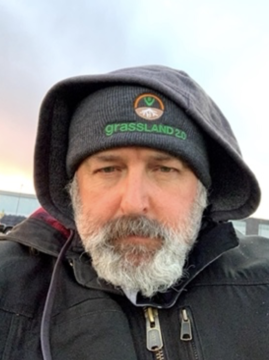 Randy Jackson and his grassland ecology group study how carbon and nutrients flow into, within, and out of grassland ecosystems. Randy grew up in southern California, played baseball and earned a BS in Environmental Science at UC Riverside, an MS in Natural Resource Sciences at Humboldt State University, and a PhD in Ecosystem Science at UC Berkeley. He joined the Department of Agronomy at UW-Madison in 2003 as part of a 3-person “cluster hire” in Agroecology. Randy teaches Grassland Ecology and co-instructs Introduction to Agroecology with Mike Bell, Claudio Gratton, and amazing graduate student teaching assistants like Ashley Becker! Randy co-leads the Wisconsin Integrated Cropping Systems Trial (WICST), a 30-year-old experiment in Arlington, WI. He also co-leads Grassland 2.0, a USDA-funded project working to transform agriculture in the upper Midwest to a system that provides for our wants and needs while cleaning water, reducing flooding, and supporting biodiversity.
Randy Jackson and his grassland ecology group study how carbon and nutrients flow into, within, and out of grassland ecosystems. Randy grew up in southern California, played baseball and earned a BS in Environmental Science at UC Riverside, an MS in Natural Resource Sciences at Humboldt State University, and a PhD in Ecosystem Science at UC Berkeley. He joined the Department of Agronomy at UW-Madison in 2003 as part of a 3-person “cluster hire” in Agroecology. Randy teaches Grassland Ecology and co-instructs Introduction to Agroecology with Mike Bell, Claudio Gratton, and amazing graduate student teaching assistants like Ashley Becker! Randy co-leads the Wisconsin Integrated Cropping Systems Trial (WICST), a 30-year-old experiment in Arlington, WI. He also co-leads Grassland 2.0, a USDA-funded project working to transform agriculture in the upper Midwest to a system that provides for our wants and needs while cleaning water, reducing flooding, and supporting biodiversity.
March 8, 2022 at 7:30pm
A Madison Treasure: The Lakeshore Nature Preserve
Dr. Gisela Kutzbach
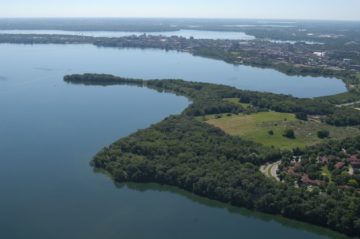 The beauty of the UW-Madison campus is renowned worldwide. The Lakeshore Nature Preserve represents one of its jewels. Popular Picnic Point and the famed Lakeshore Path extending from the Memorial Union to Picnic Point are treasured by the university and the Madison community alike. Dr. Gisela Kutzbach will discuss this success story of environmental conservation and community commitment.
The beauty of the UW-Madison campus is renowned worldwide. The Lakeshore Nature Preserve represents one of its jewels. Popular Picnic Point and the famed Lakeshore Path extending from the Memorial Union to Picnic Point are treasured by the university and the Madison community alike. Dr. Gisela Kutzbach will discuss this success story of environmental conservation and community commitment.
Why is experiencing nature important? Why do visitors flock to the Preserve? How do they seek to connect with nature in this place? This area constitutes one-third of the campus lands. How does the university make use of it and how is it managed and protected for future generations? How do cultural and historical values explain this nature preserve in an urban setting? Find out some answers to these questions and bring your own to this webinar with Gisela.
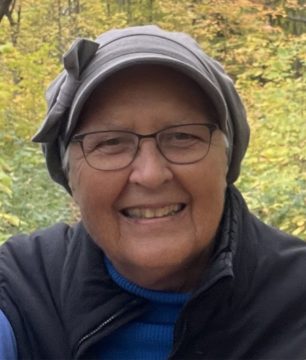 Growing up in crowded, walled-in Berlin, Germany, Gisela learned first-hand about the delicate balance between the need for preserving natural areas and the need for public access. Gisela and her family have long treasured and used the Lakeshore Nature Preserve. She’s walked to campus along Lakeshore Path since her graduate student days and while teaching in the College of Engineering and directing its Technical Communication program. She has noted changes in Preserve use, access, and landscaping. Gisela has served the Preserve by volunteering for the Friends of the Lakeshore Nature Preserve for 15 years, three years as president. She earned her BS in meteorology from the Free University of Berlin, and an MS in meteorology and Ph.D. in the history of science from the University of Wisconsin.
Growing up in crowded, walled-in Berlin, Germany, Gisela learned first-hand about the delicate balance between the need for preserving natural areas and the need for public access. Gisela and her family have long treasured and used the Lakeshore Nature Preserve. She’s walked to campus along Lakeshore Path since her graduate student days and while teaching in the College of Engineering and directing its Technical Communication program. She has noted changes in Preserve use, access, and landscaping. Gisela has served the Preserve by volunteering for the Friends of the Lakeshore Nature Preserve for 15 years, three years as president. She earned her BS in meteorology from the Free University of Berlin, and an MS in meteorology and Ph.D. in the history of science from the University of Wisconsin.
February 8, 2022 7:30pm
Wolves, People, Domestic Animals, and Deer
Dr. Adrian Treves, Professor of Environmental Studies, UW-Madison
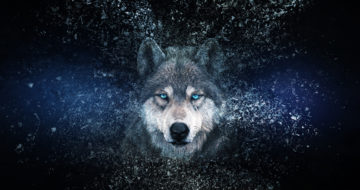 Coexistence with wildlife has become increasingly important and contentious as humans encroach on traditional wild habitat around our state. Dr. Adrian Treves will address the current debate over wolves and their interactions with people, domestic animals and deer. Building on ecological and social scientific data he and colleagues have collected over two decades, he will discuss our coexistence with wildlife commonly around us. He will explain how to differentiate science from value judgment in claims from agencies and interest groups, and how to distinguish the best wildlife science from the rest following principles of ‘Open Science’. Adrian will also suggest how each of us can help promote a more just and healthy relationship to nature during the present extinction and global crisis.
Coexistence with wildlife has become increasingly important and contentious as humans encroach on traditional wild habitat around our state. Dr. Adrian Treves will address the current debate over wolves and their interactions with people, domestic animals and deer. Building on ecological and social scientific data he and colleagues have collected over two decades, he will discuss our coexistence with wildlife commonly around us. He will explain how to differentiate science from value judgment in claims from agencies and interest groups, and how to distinguish the best wildlife science from the rest following principles of ‘Open Science’. Adrian will also suggest how each of us can help promote a more just and healthy relationship to nature during the present extinction and global crisis.
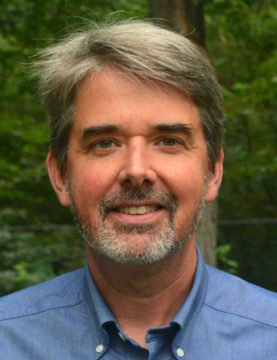 Adrian Treves is a Professor of Environmental Studies at the University of Wisconsin-Madison and has been director of the Carnivore Coexistence Lab since 2007. For 27 years, his research has focused on ecology, law, and human dimensions of ecosystems in which crop and livestock ownership overlaps the habitat of carnivores from coyotes up to grizzly bears. Based on his independent research, Adrian advocates for future generations of all life, for scientific integrity, and for sovereign publics worldwide. He studies and speaks about the public trust doctrine and intergenerational equity around the world. He earned his PhD at Harvard University in 1997 and has authored over 130 scientific papers on predator-prey ecology or conservation.
Adrian Treves is a Professor of Environmental Studies at the University of Wisconsin-Madison and has been director of the Carnivore Coexistence Lab since 2007. For 27 years, his research has focused on ecology, law, and human dimensions of ecosystems in which crop and livestock ownership overlaps the habitat of carnivores from coyotes up to grizzly bears. Based on his independent research, Adrian advocates for future generations of all life, for scientific integrity, and for sovereign publics worldwide. He studies and speaks about the public trust doctrine and intergenerational equity around the world. He earned his PhD at Harvard University in 1997 and has authored over 130 scientific papers on predator-prey ecology or conservation.
MGE Talks Business: Pasture and Plenty and Bethel Lutheran Prioritize Sustainability
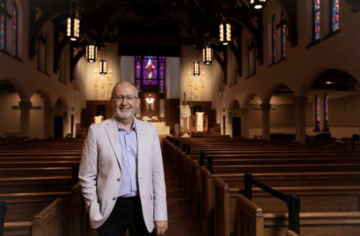 Pasture and Plenty and Bethel Lutheran both share a community-focused ethos, an earth-friendly approach to operations and now, a commitment to MGE’s Shared Solar program.
Pasture and Plenty and Bethel Lutheran both share a community-focused ethos, an earth-friendly approach to operations and now, a commitment to MGE’s Shared Solar program.
Shared Solar is a voluntary program for MGE electric customers who pay a one-time fee to reserve a portion of the program’s locally generated solar electricity. Participating customers then pay a stable electricity rate for 25 years. Subscribers can purchase up to half of their annual electricity through Shared Solar.
Pasture and Plenty, a meal kit service and farm-to-table deli and catering company, and Bethel Lutheran both opted to join the program this year, seeing it as an easy and affordable way to live their commitment to renewable energy.
“We had investigated having our own array, but that would only provide 11% of the energy our facility needed,” said Pastor Mike Brown. “Being part of Shared Solar allowed us to get 50% of our electricity through solar and was the fastest way to contribute in a positive way to caring for creation.”
Caring for Creation Presents: June Emphasis on Environmental Stewardship
C4C encourages you to make time for these brief videos as we renew together our commitment to preserving and protecting God’s Creation.
ENVIRONMENTAL FRIDAYS
The videos are short educational presentations on taking action to create a more sustainable environment.
June 4 – Ceramic Water Filter Production Project in Rwanda
June 11 – Recycling: Addressing the Crisis
June 18 – Energy Efficiency: Adapting Bethel’s Energy Systems
June 25 – Clean Energy: Investing in Solar Energy
July 9 – Creating “Good Soil”
TUESDAY DEVOTIONS
These videos reflect on what ‘caring for creation’ means during June’s environmental sustainability emphasis.
June 1 – Todd Fansler
June 8 – Tom Solheim
June 15 – Gisela Kutzbach
June 22 – Wilda Nilsestuen
MG&E & Bethel Shared Solar Ribbon-Cutting Ceremony
Bethel’s Sustainability Pledge Form
Sermon Series: And It Was Good: Stewards of Creation
June 6 – Pastor Mike Brown
June 13 – Dr. Rossing
June 20 – Dr. Peter Bakken

